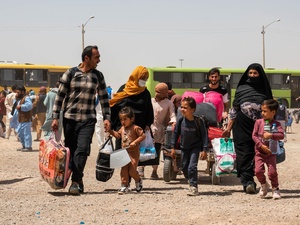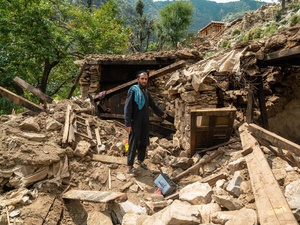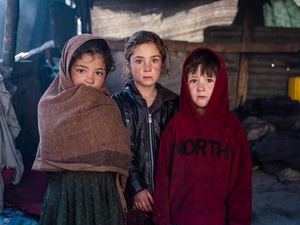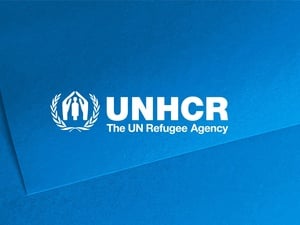Afghanistan: voluntary return programmes increasingly popular
Afghanistan: voluntary return programmes increasingly popular
More than 5,300 Afghans returned to their homes Monday under UNHCR/Afghan government initiatives to help refugees and internally displaced persons. Each day, more and more Afghans come forward to participate in the voluntary return programmes. A total of 4,472 refugees crossed into Afghanistan from Pakistan yesterday, while 824 displaced Afghans left Kabul's ex-Soviet compound for the Shomali region of central Afghanistan.
Since the start of the joint Afghan government and UNHCR assisted return programme on 1 March, a total of 18,464 Afghans have repatriated from Pakistan, while more than 3,800 displaced Afghans have returned to their villages in the Shomali Plain.
The movement from Kabul's former Soviet embassy compound started last Wednesday, when the first IDPs were trucked by the International Organisation for Migration back to the central Afghan plain they abandoned three years ago. In coming weeks, agencies plan to assist up to 15,000 Afghans to return to Shomali.
UNHCR has so far opened five aid distribution points in Afghanistan - three in the eastern region and two in the central region. In all, we plan to open 32 distribution points in Afghanistan which will be managed by the German NGO GTZ.
We are also discussing with the Interim Administration and other UN agencies how to address the long-term development needs of the refugees and the internally displaced persons, and how to help their home communities.
UNHCR expects to start assisting Afghans home from Iran beginning from 1 April. Together with the Iranian authorities we have already established eight registration centres - in Teheran, Mashad, Zahedan, Isfahan, Yazd, Qom, Shiraz and Kerman - that will register refugees opting to return. Returnees will get the same assistance as Afghans repatriating from Pakistan.
The Iranian authorities have been very flexible in relaxing customs restrictions for Afghans. Each Afghan leaving Iran can return with $1,000, plus an unlimited amount of Iranian Rials or Afghanis. Families can also repatriate with personal effects valued at up to $1,000. This should help to encourage Afghans, many of whom have been living in Iran for decades, to return.
Iran hosts some 1.5 million Afghan refugees, while Pakistan shelters 2 million. UNHCR has appealed for $271 million to help Afghan refugees outside their homeland, to undertake rehabilitation projects inside Afghanistan, and to return up to 1.2 million Afghans. This year, together with the Afghan authorities, we plan to help 800,000 refugees from Pakistan and Iran to repatriate while another 400,000 displaced Afghans will also be helped home.









